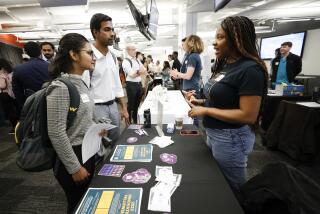Studies Find Age Discrimination Not So Prevalent in the Tech World
- Share via
Talk to job seekers over age 40 and you’ll hear stories about being rejected by potential employers for reasons that sound suspiciously like age discrimination.
The issue has special resonance in the high-tech industry, which prizes the innovation that young, creative minds bring to the workplace. For years, vocal groups of older techies have complained that, as they age, they are systematically excluded from top programming and engineering jobs because employers fear they will command too high a salary, work shorter hours and let their skills grow stale.
But, in what has come as a surprise to industry observers, two recent authoritative reports contradict the widespread assumption that age discrimination pervades today’s technology sector.
The U.S. chapter of the Institute of Electrical and Electronics Engineers released a study last month based on interviews with 528 people, including personnel representatives, hiring managers and engineers--above and below age 45. Its conclusion: Age bias occurs far less frequently than one might think. Only 10% of the workers who reported having bad work experiences in the last five years attributed their troubles to age discrimination.
“For most of us, that was somewhat surprising,” said John Steadman, IEEE’s vice president for career activities and head of the University of Wyoming’s department of electrical engineering. “Ten years ago . . . IEEE found more cases where we needed to help our members get quick retraining or relocation assistance.”
A report from the National Research Council of the National Academy of Sciences recently considered the issue of age bias in the tech sector but determined there was not enough evidence to draw scientific conclusions.
“The committee cannot determine whether illegal age discrimination occurs either more or less in [information technology] than in any other industry,” it said in its October report.
“Just because people aren’t reporting it doesn’t mean it’s not happening,” said Laurie McCann, a senior attorney at AARP, formerly known as the American Assn. of Retired Persons, who regularly handles age bias cases. “Most discrimination is in hiring, which is very difficult to prove. You don’t know who was hired because you never got a response, unless you have somebody in the company tell you. Most people are not going to file a charge on a gut feeling.”
The booming economy, which ushered in national unemployment rates of less than 4%, might be older workers’ biggest ally, according to representatives from the engineering institute. But if the economy’s much-hoped-for “soft” landing produces a few bumps in the next several quarters, techies over age 40 could feel a disproportionate amount of turbulence.
“A downturn in the economy could seriously cloud job prospects for older engineers because of the unfortunate perception that they contribute less value than the younger engineers do,” said Shankar Lakhavani, an IEEE official and a Pittsburgh-based engineer. “This perception needs to be corrected.”
Career experts say older technical workers can overcome these problems by how they market themselves. For instance, in the recent engineering study, both hiring managers and personnel directors ranked veteran techies as having strong problem-solving and management skills. The hiring managers valued leadership and communication over knowing the hottest new computer language.
Problem is, human resources officials who might not be proficient in technology often make decisions based on whether newer skill sets appear on a resume--not realizing that many older workers can learn new tricks in a refresher course.
“That’s where the big disconnect occurs,” Steadman said. “Getting a new skill is a fairly short-term situation.”
Lakhavani suggested that engineers use their industry connections to spread the word about models, reports and certifications they’ve gained. He said he often notices inexperienced engineers making mistakes that caused project delays and lost revenue.
“These . . . can effectively cancel out any perceived savings employers are getting by hiring inexperienced young engineers,” he said.
That’s another pitch veterans can make.
If a pink slip does come an older worker’s way, career support groups such as 40 Plus (https://www.fp.org ) can help ease the transition. The group’s Washington chapter offers a two-week career evaluation program. Although the group is not focused on technology, it is a place to get big-picture advice, said President Margaret Reuthinger.
More entrepreneurial-minded workers might consider selling their experience for higher rates as a contractor, said Mark Mehler, coauthor of “Careerxroads,” a guide to job sites on the Web.






